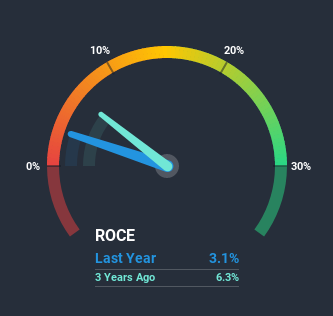Should You Be Worried About Corning's (NYSE:GLW) Returns On Capital?

If you're looking at a mature business that's past the growth phase, what are some of the underlying trends that pop up? Businesses in decline often have two underlying trends, firstly, a declining return on capital employed (ROCE) and a declining base of capital employed. This indicates to us that the business is not only shrinking the size of its net assets, but its returns are falling as well. So after glancing at the trends within Corning (NYSE:GLW), we weren't too hopeful.
Understanding Return On Capital Employed (ROCE)
For those who don't know, ROCE is a measure of a company's yearly pre-tax profit (its return), relative to the capital employed in the business. To calculate this metric for Corning, this is the formula:
Return on Capital Employed = Earnings Before Interest and Tax (EBIT) ÷ (Total Assets - Current Liabilities)
0.031 = US$751m ÷ (US$28b - US$3.0b) (Based on the trailing twelve months to June 2020).
So, Corning has an ROCE of 3.1%. In absolute terms, that's a low return and it also under-performs the Electronic industry average of 10%.
Check out our latest analysis for Corning
Above you can see how the current ROCE for Corning compares to its prior returns on capital, but there's only so much you can tell from the past. If you'd like, you can check out the forecasts from the analysts covering Corning here for free.
The Trend Of ROCE
We are a bit worried about the trend of returns on capital at Corning. About five years ago, returns on capital were 6.7%, however they're now substantially lower than that as we saw above. Meanwhile, capital employed in the business has stayed roughly the flat over the period. Companies that exhibit these attributes tend to not be shrinking, but they can be mature and facing pressure on their margins from competition. So because these trends aren't typically conducive to creating a multi-bagger, we wouldn't hold our breath on Corning becoming one if things continue as they have.
The Bottom Line
In summary, it's unfortunate that Corning is generating lower returns from the same amount of capital. Yet despite these poor fundamentals, the stock has gained a huge 126% over the last five years, so investors appear very optimistic. Regardless, we don't feel to comfortable with the fundamentals so we'd be steering clear of this stock for now.
On a final note, we've found 5 warning signs for Corning that we think you should be aware of.
While Corning isn't earning the highest return, check out this free list of companies that are earning high returns on equity with solid balance sheets.
This article by Simply Wall St is general in nature. It does not constitute a recommendation to buy or sell any stock, and does not take account of your objectives, or your financial situation. We aim to bring you long-term focused analysis driven by fundamental data. Note that our analysis may not factor in the latest price-sensitive company announcements or qualitative material. Simply Wall St has no position in any stocks mentioned.
Have feedback on this article? Concerned about the content? Get in touch with us directly. Alternatively, email editorial-team@simplywallst.com.



